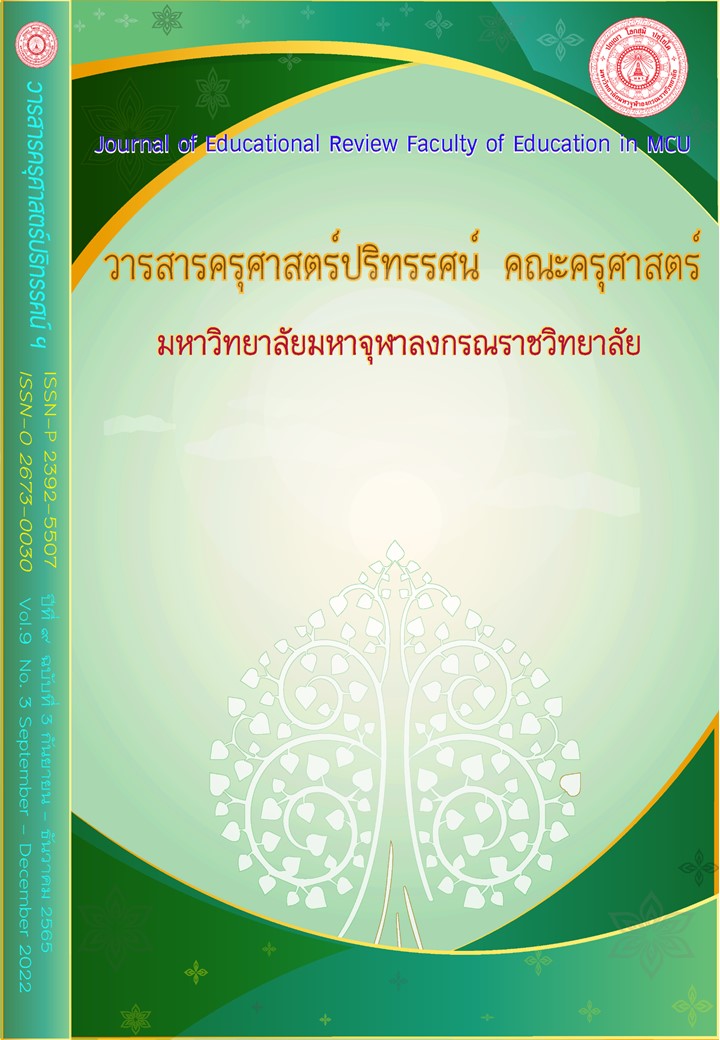THE DEVELOPMENT OF ONLINE LESSONS BASE ON GAGNE’S PRINCIPLE AND CASE STUDY FOR THE DEVELOPMENT OF ANALYTICAL THINKING ABILITY OF GRADE 10 STUDENTS, SAMSENWITTAYALAI SCHOOL
Main Article Content
Abstract
The objectives of this research were: 1) to develop Online Lessons of Grade 10 Students, Samsenwittayalai School. 2) to dtudy of Analytical Thinking Ability of Grade 10 Students, Samsenwittayalai School with Online Lessons. This research was A Quasi-Equivalent Control Group Designs research. The research samples were Grade 10 Students, Samsenwittayalai School in semester 2 of academic year 2021. An experimental group that study with Online Lessons 29 students, and a control group that study with traditional teaching method 24 students. The research instruments were An Online Lessons, A Lesson Plan, A Tool Assessment and An Analytical Thinking Ability Test. Data were analyzed by Arithmetic mean, Standard deviation, t-Test, and Size Effect. The results of this research revealed that 1) Online Lessons base on Gagne’s Principle and Case Study has the 4 main components: The content section which provides knowledge about criminal law, The learning management system section which uses Google Classroom with Edpuzzle, The communication section that is two-way synchronous communication via Google Meet, and The learning outcomes section that measured through An Analytical Thinking Ability Test via Google Form. The advantages of online Lessons are that students get feedback while learning and can discuss case studies in classroom that the researcher presented. 2) The student’s Analytical Thinking Ability Test scores after learning through of Online Lessons was higher than The student’s Analytical Thinking Ability Test scores after learning through of traditional teaching method at .01 level and the Effect size is Very Large.
Article Details

This work is licensed under a Creative Commons Attribution-NonCommercial-NoDerivatives 4.0 International License.
ทัศนะและความคิดเห็นที่ปรากฏในบทความในวารสารฉบับนี้ถือเป็นความรับผิดชอบของผู้เขียนบทความนั้นเพียงผู้เดียว และไม่ถือเป็นทัศนะและความรับผิดชอบของกองบรรณาธิการ
กองบรรณาธิการขอสงวนสิทธิ์ในการคัดเลือกบทความลงตีพิมพ์และจะแจ้งให้เจ้าของบทความทราบหลังจากผู้ประเมินบทความตรวจอ่านบทความแล้ว
ต้นฉบับที่ได้รับการตีพิมพ์ในวารสารครุศาสตร์ปริทรรศน์ คณะครุศาสตร์ มหาวิทยาลัยมหาจุฬาลงกรณราชวิทยาลัย ถือเป็นกรรมสิทธิ์ของคณะครุศาสตร์ มหาวิทยาลัยมหาจุฬาลงกรณราชวิทยาลัย ห้ามนำข้อความทั้งหมดหรือบางส่วนไปพิมพ์ซ้ำ เว้นเสียแต่ว่าจะได้รับอนุญาตจากมหาวิทยาลัยฯ เป็นลายลักษณ์อักษร
References
กมลวจี พรมแสง และศิริวรรณ วณิชวัฒนวรชัย. (2562). การพัฒนาความสามารถในการคิดวิเคราะห์ เรื่อง อุปมาของพระเยซูเจ้าสำหรับนักเรียนชั้นมัธยมศึกษาปีที่ 1 โดยการจัดการเรียนรู้แบบกรณีศึกษา. วารสารศึกษาศาสตร์ มหาวิทยาลัยศิลปากร. 17(1). 83-96.
ฐาปนีย์ ธรรมเมธา. (2557). อีเลิร์นนิง: จากทฤษฎีสู่การปฏิบัติ e-Learning: from theory to practice. กรุงเทพมหานคร: สหมิตรพริ้งติ้งแอนด์พับลิสชิ่ง.
ทิศนา แขมมณี. (2555). ศาสตร์การสอน: องค์ความรู้เพื่อการจัดกระบวนการเรียนรู้ที่มีประสิทธิภาพ. พิมพ์ครั้งที่ 15. กรุงเทพมหานคร: จุฬาลงกรณ์มหาวิทยาลัย.
ธวัชชัย สหพงษ์. (2563). ผลการพัฒนาสื่อมัลติมีเดียส่งเสริมศิลปวัฒนธรรมตามรูปแบบ ADDIE Model ใน รายวิชาการพัฒนาสื่ออิเล็กทรอนิกส์เพื่อการเรียนการสอน. วารสารวิชาการการจัดการเทคโนโลยี มหาวิทยาลัยราชภัฏมหาสารคาม. 7(2). 7-14.
ธีรนันทน์ ไกรเลิศ และดรุณี จำปาทอง. (2564). ผลการจัดการเรียนรู้โดยใช้กรณีศึกษา เรื่อง สันติวัฒนธรรมที่มีผลต่อความสามารถในการคิดวิเคราะห์ของนักศึกษาระดับประกาศนียบัตรวิชาชีพชั้นสูงวิทยาลัยเทคนิคกระบี่. คุรุสภาวิทยาจารย์. 2(2). 74-84.
นิรันดร์ ชัยวิเศษ และสมทรง สิทธิ. (2564). การพัฒนาความสามารถในการคิดวิเคราะห์และผลสัมฤทธิ์ทางการเรียนวิชาคอมพิวเตอร์โดยใช้บทเรียน CAI ด้วยโปรแกรม Coding ตามแนวคิดกาเย่ ชั้นประถมศึกษาปีที่ 6. วารสารสถาบันวิจัยพิมลธรรม. 8(2). 40-51.
มุกดา อรุณรังษี. (2561). การใช้บทเรียนบนเว็บที่เน้นกระบวนการเรียนรู้ตามแนวคิดของกาเย่ รายวิชาการเขียนเว็บไซต์ด้วยภาษา HTML1 ของนักเรียนชั้นมัธยมศึกษาปีที่ 5 โรงเรียนปากพะยูนพิทยาคาร. วารสารศึกษาศาสตร์ มหาวิทยาลัยสงขลานครินทร์ วิทยาเขตปัตตานี. 29(3). 79-92.
วัชรา เล่าเรียนดี. (2548). เทคนิคและยุทธวิธีพัฒนาทักษะการคิดการจัดการเรียนรู้ที่เน้นผู้เรียนเป็นสำคัญ. นครปฐม: มหาวิทยาลัยศิลปากร.
ศักดิ์คเรศ ประกอบผล. (2563). การวิเคราะห์ผู้เรียน: ลีลาการเรียนรู้. ครุศาสตร์วารสาร: Journal of Educational Studies. 14(2). 1-14.
สุพัฒน์ สุกมลสันต์. (2553). ขนาดของผล: ความมีนัยสำคัญทางปฏิบัติในการวิจัย. วารสารภาษาปริทัศน์. 25. 26-28.
สุภารักษ์ เมินกระโทก, วีรพงษ์ พลนิกรกิจ และนฤมล รักษาสุข. (2563). ประสิทธิผลของการใช้อีเลิร์นนิงใน รายวิชาเตรียมสหกิจศึกษา มหาวิทยาลัยเทคโนโลยีสุรนารี. วารสารอิเล็กทรอนิกส์การเรียนรู้ทางไกลเชิงนวัตกรรม. 10(2). 73-87.


